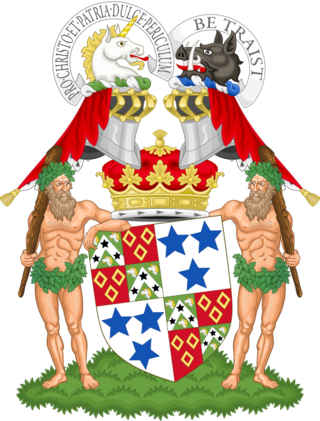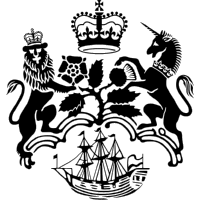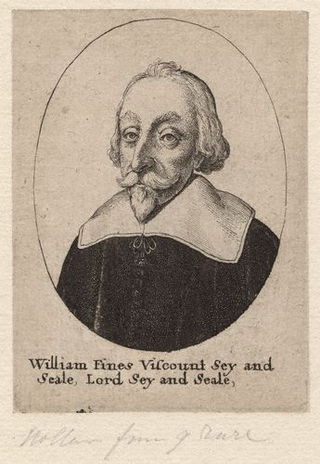Related Research Articles

Edward Montagu, 2nd Earl of Manchester, KG, KB, FRS was an important commander of Parliamentary forces in the First English Civil War, and for a time Oliver Cromwell's superior.

The secretary of state for the colonies or colonial secretary was the Cabinet of the United Kingdom's minister in charge of managing the British Empire.

Anthony Ashley Cooper, 1st Earl of Shaftesbury PC, FRS, was an English statesman and peer. He held senior political office under both the Commonwealth of England and Charles II, serving as Chancellor of the Exchequer from 1661 to 1672 and Lord Chancellor from 1672 to 1673. During the Exclusion Crisis, Shaftesbury headed the movement to bar the Catholic heir, James II, from the royal succession, which is often seen as the origin of the Whig party. He was also a patron of the political philosopher John Locke, with whom Shaftesbury collaborated with in writing the Fundamental Constitutions of Carolina in 1669.

The Duke of Roxburghe is a title in the peerage of Scotland created in 1707 along with the titles Marquess of Bowmont and Cessford, Earl of Kelso and Viscount Broxmouth. John Ker, 5th Earl of Roxburghe became the first holder of these titles. The title is derived from the royal burgh of Roxburgh in the Scottish Borders that in 1460 the Scots captured and destroyed.

Charles Spencer, 3rd Earl of Sunderland, KG, PC, known as Lord Spencer from 1688 to 1702, was an English statesman and nobleman from the Spencer family. He served as Lord Lieutenant of Ireland (1714–1717), Lord Privy Seal (1715–1716), Lord President of the Council (1718–1719) and First Lord of the Treasury (1718–1721).

Thomas Osborne, 1st Duke of Leeds, was an English Tory politician and peer. During the reign of Charles II of England, he was the leading figure in the English government for roughly five years in the mid-1670s. Osborne fell out of favour due to corruption and other scandals. He was impeached and eventually imprisoned in the Tower of London for five years until James II of England acceded in 1685. In 1688, he was one of the Immortal Seven who invited William of Orange to depose James II during the Glorious Revolution. Osborne was again the leading figure in England's government for a few years in the early 1690s before dying in 1712.

Thomas Howard, 14th Earl of Arundel KG, was an English peer, diplomat and courtier during the reigns of King James I and King Charles I, but he made his name as a Grand Tourist and art collector rather than as a politician. When he died he possessed 700 paintings, along with large collections of sculptures, books, prints, drawings, and antique jewellery. Most of his collection of marble carvings, known as the Arundel marbles, was eventually left to the University of Oxford.

Earl of Dundee is a title in the Peerage of Scotland. It was created in 1660 for John Scrymgeour, 3rd Viscount Dudhope. At his death in 1668, the Duke of Lauderdale declared that the first Earl had no heirs-male, and had the crown seize all of his lands. The earldom of Dundee became dormant and its holdings and offices were granted to Charles Maitland, 3rd Earl of Lauderdale, the Duke's younger brother. The title was revived in 1953, when it was determined that the first Earl did indeed have heirs-male, contrary to the assertion of the crown. The title was given to Henry James Scrymgeour-Wedderburn, who had previously served in the House of Commons and in the Cabinet.

The Board of Trade is a British government body concerned with commerce and industry, currently within the Department for Business and Trade. Its full title is The Lords of the Committee of the Privy Council appointed for the consideration of all matters relating to Trade and Foreign Plantations, but is commonly known as the Board of Trade, and formerly known as the Lords of Trade and Plantations or Lords of Trade, and it has been a committee of the Privy Council of the United Kingdom. The board has gone through several evolutions, beginning with extensive involvement in colonial matters in the 17th century, to powerful regulatory functions in the Victorian Era and early 20th century. It was virtually dormant in the last third of the 20th century. In 2017, it was revitalised as an advisory board headed by the International Trade Secretary who has nominally held the title of President of the Board of Trade, and who at present is the only privy counsellor of the board, the other members of the present board filling roles as advisors.

William Fiennes, 1st Viscount Saye and Sele was an English nobleman and politician. He was a leading critic of Charles I's rule during the 1620s and 1630s. He was known also for his involvement in several companies for setting up overseas colonies.
A lord proprietor is a person granted a royal charter for the establishment and government of an English colony in the 17th century. The plural of the term is "lords proprietors" or "lords proprietary".

William Seymour, 2nd Duke of Somerset, was an English nobleman and Royalist commander in the English Civil War.

Robert Montagu, 3rd Earl of Manchester JP was an English courtier and politician who sat in the House of Commons from 1660 to 1671 when he inherited the peerage as Earl of Manchester.

The Conservative government of the United Kingdom that began in 1957 and ended in 1964 consisted of three ministries: the first Macmillan ministry, second Macmillan ministry, and then the Douglas-Home ministry. They were respectively led by Harold Macmillan and Sir Alec Douglas-Home, who were appointed by Queen Elizabeth II.
The Committee of Both Kingdoms was a committee set up during the Wars of the Three Kingdoms by the Parliamentarian faction in association with representatives from the Scottish Covenanters, after they made an alliance in late 1643.
Sir John Ernle was an English politician who sat in the House of Commons at various times between 1654 and 1695. He was one of the longest-serving Chancellors of the Exchequer, a position he held from 2 May 1676 to 9 April 1689.

Clan Primrose is a Lowland Scottish clan.

The Canningites, led by George Canning and then the Viscount Goderich as First Lord of the Treasury, governed the United Kingdom of Great Britain and Ireland from 1827 until 1828.
References
- ↑ "Lords of Trade and Plantation". www.encyclopedia.com. Encyclopedia.com. Retrieved 19 June 2019.
- ↑ Office-Holders in Modern Britain: Volume 3, Officials of the Boards of Trade 1660-1870. London: University of London. 1974. pp. 25–27.